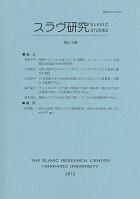戦後シベリアの社会主義工業化 ―― アンガラ川流域開発を中心に ――
Socialist Industrialization in Post-war Siberia: The Angara River Basin Development Project
Author(s): Masahiro TokunagaSubject(s): Economy
Published by: Slavic Research Center
Summary/Abstract: This article examines the impact of socialist industrialization upon the economy of Siberia, focusing on the Angara River basin development project in Eastern Siberia. This project is said to have brought major changes to the economic geography of Irkutsk oblast through which the Angara River flows in the upper basin, creating one of the largest industrialized areas in Siberia. Using a micro-level database culled from business information reports, I analyze location patterns of industrial firms in developed regions in Siberia, and propose the concepts of “sheet industrialization” and “dot industrialization” with a view toward measuring the reality of socialist industrialization in post-war Siberia. In order to reevaluate the basic principles, schemes, and results of the Angara River basin development project, I reappraise the relevant literature including works by Nikolay Kolosovskiy, who was engaged as a top leader in preparing and effectuating this ambitious development plan for a quarter of the twentieth century. Finally, this article attempts to gauge the post-war industrial output of Irkutsk oblast by using both official statistics and declassified archival documents. This allows us to estimate the economic impact of the Angara River basin development project upon the regional economy. By doing so, this article argues for the relevance of the concepts of “sheet industrialization” and “dot industrialization” in understanding the nature of socialist industrialization in the vast space of Siberia. Estimating the post-war industrial output of Irkutsk oblast seems to prove that the Angara River basin development project had an immense impact upon the regional economy and contributed to rapid industrialization-lead economic growth in the post-war period until the mid-1970s. Based on this fact, Soviet scholars contended that the development project demonstrated the superiority of socialist industrialization over capitalist industrialization. Much closer analysis of the industrialization of Irkutsk oblast reveals that there was almost no change in the composition of industrial sectors over forty years, however. In addition, the region did not see what advocates of socialist industrialization had intended, that is, heavy-industry-oriented development in the domestic backward regions of Siberia. This apparent contradiction derives from too simplified an approach to socialist industrialization in “archipelago Russia.
Journal: Slavic Studies
- Issue Year: 2012
- Issue No: 59
- Page Range: 115-143
- Page Count: 29
- Language: Japanese

